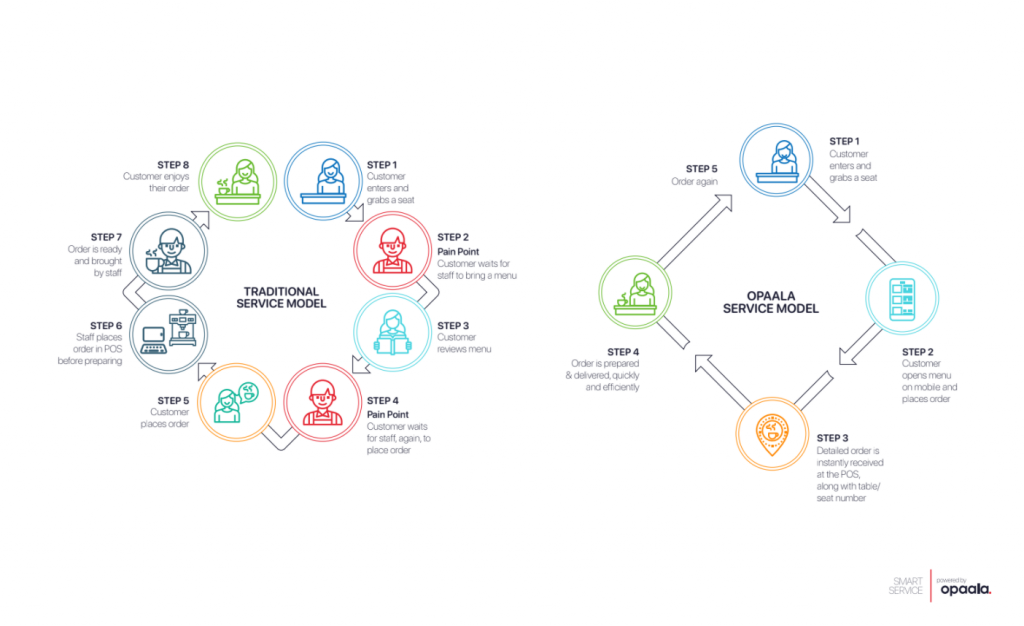Dubai, UAE-based Opaala, a hospitality-tech startup comes in as a solution to tackle the hospitality industry pitfalls following the COVID-19 outbreak with its innovative smart service system that is now integrated into multiple venues across the UAE with the objective to boost sales and provide contactless interactions. The company provides a seamless solution to allow hotels, restaurants, nightlife spots, and beach clubs to navigate a new, promising era of hospitality.
With the COVID-19 pandemic and resulting lockdowns delivering hard blows to the hospitality and food & beverage industries across the UAE, lack of staff is evident within a variety of venues as businesses struggle to rake in sales, resulting in an endless cycle of no staff, bad customer service, and low sales on repeat. With Opaala’s smart service platform integrated into Point-of-Sales (POS) systems, venues can be assured to see a noticeable boost in revenue with its simple ‘tap’ of a Quick Response (QR) code technology that enables a ‘self-ordering’ system designed to streamline the dine-in process. Opaala’s smart service platform can be integrated into most POS systems and has already greatly improved sales from venues that have suffered during the COVID-19 period, and boasts partnerships with great brands such as Nikki Beach Club, Lah Lah Restaurant, Riva Beach Club, Anantara and more.
Opaala changes the traditional ‘8-step service model’ by reducing staff costs, eliminating service wait times, and increasing revenue through a contactless, app-free, mobile-powered solution. With Opaala, customers can simply scan a QR code, browse through high-design, interactive menus where they can place orders, enter dietary requirements, request for the assistance of a waiter, and call for the bill all through their mobile browsers. Opaala’s solution is browser-based, eliminating the need to download a mobile application, can seamlessly integrate into the venue’s POS system and can be customized for branding needs. Further simplifying the ‘going-out’ experience, Opaala offers automatic bill splitting, making it easier for guests and venues to clear the cheque, customers can also complete their order via safe checkout using Apple Pay, Debit, and Credit Cards. Meanwhile, venues can host daily and hourly specials on their interactive menus, and schedule them for future events. These deals allow venues to organically market their offerings at the time of ordering.
Opaala can be used across the hospitality industry, including restaurants, cinemas, hospitals, food courts, in-room and within lounges and beach cabanas at hotels, stadiums and event arenas.
How it works?

The three-pronged system includes services Opaala inVenue™ for restaurants, and Opaala inRoom™ for hotels, which are aimed at assisting the recovery of the hospitality industry. The technology company also provides Opaala reMote™, which offers a local order and delivery platform designed to help businesses increase their reach. These systems will enable venues to cut down on operational costs, working with a skeleton crew whilst simultaneously upholding excellent standards of service.
The COVID-19 Solution
Not only does Opaala allow businesses to reduce costs and remain functional during the volatile conditions created by the COVID-19 pandemic, but the solution also enables customers to feel safe whilst enjoying meals at their favourite venues by providing a fully contactless service.
Speaking about the innovation, Marwan Saab, Opaala’s Co-founder, shared the core cognition behind Opaala’s establishment,
“It is easy for customers to be overlooked when venues are managing high footfall. We wish to enhance the diner’s experience whilst assisting restaurants with managing their ever-increasing costs,”
With a mission to help hospitality venues maximise their offering and run as efficiently as possible, Opaala strives to ensure that customers make the most of their experience at each venue with full access to information including popular and special items and deals. Thereby placing customers in full control of their dining experience and eliminating the need for restaurant staff to manage communication with several tables at once.





